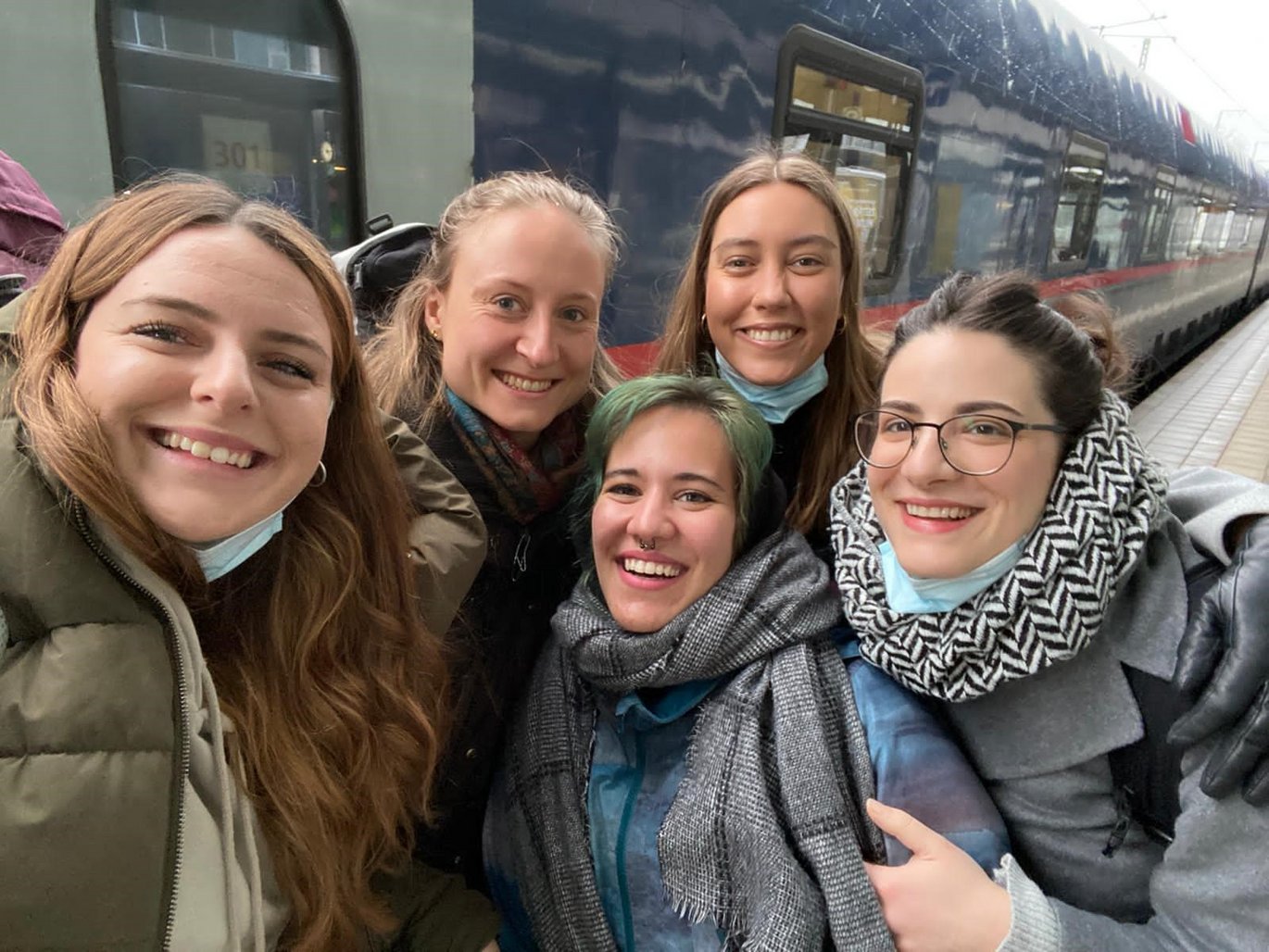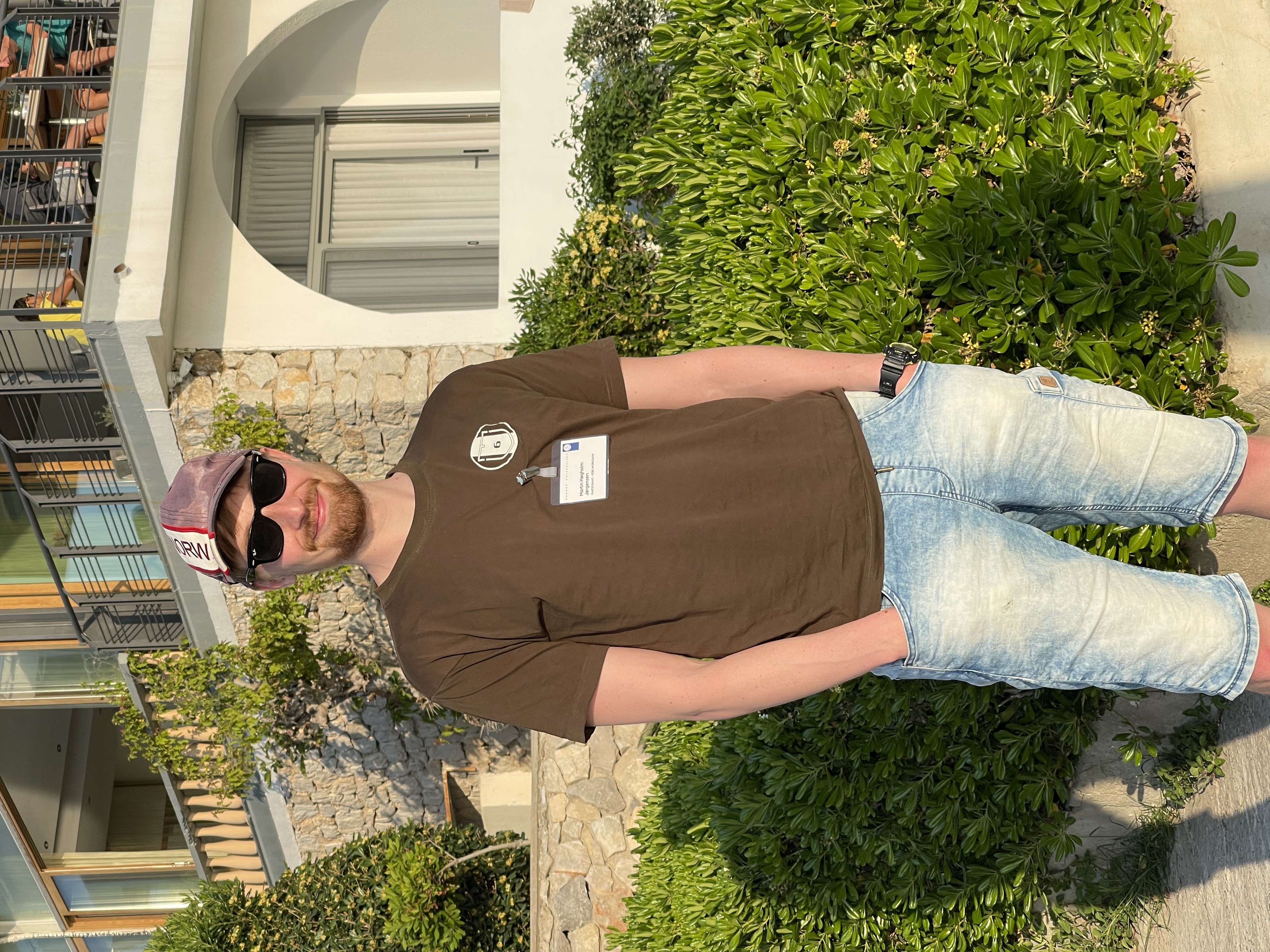PhD students take the train to conferences to save CO2 emissions
PhD students from the Department of Molecular Biology and Genetics, Aarhus University, who have participated in international conferences in Germany and Greece, have chosen to take the train for environmental reasons, even though it resulted in a significantly longer travel time.




PhD students Maria Meisner Larsen and Martin Høgholm Jørgensen have helped start the project greenMBG at the Department of Molecular Biology and Genetics (MBG) at Aarhus University, which focuses on recycling, the environment and climate. When they were admitted to conferences for PhD students and postdocs in Freiburg in southern Germany, in April, and on the Greek island of Spetses, off the mainland Peloponnese, in May, respectively, they had no doubt that the trip had to go by train and not by plane to save on CO2 emissions.
On the trip to Freiburg, a group of five women from MBG travelled together - Anna Martyn, Henriette Rübsam, Magdalini Tsitsikli, Maria Meisner Larsen and Malita Nørgaard.
Maria Meisner Larsen:
“The trip by train from Aarhus to Freiburg took between 12 and 15 hours each way, while a trip by plane to Freiburg would have resulted in a stopover and a further transport by train, whereby the advantage of a plane would have been reduced but still faster. In terms of price, the train trip was a few thousand kroner cheaper, but the purpose of the trip was not to save money but CO2 emissions.”
“On the trip there, we had approx. 2 1/2 hours’ stay in Hamburg. As train stations, as opposed to airports, are usually located in the middle of the city, we had time to go into the city and have dinner, which was a really nice bonus on the trip,” continues Maria. "After dinner, we went back to the station and found our next train, which was a night train. We went to sleep in Hamburg and woke up in Freiburg after a night's sleep, which I think is a really good way to travel, as you can then - if you can sleep on a train - wake up at your destination fairly fresh,” Maria concludes.
Four days’ travel by train to reach Greece
For the trip to the Greek island of Spetses, there was a significant difference in travel time by plane and train.
Martin Høgholm Jørgensen, who travelled alone by train to Greece, states:
“A flight to Athens with a stopover would take about seven hours. In addition, you have transport to and from the airport and waiting time, and that probably add several extra hours. However, it still does not come close to the four days it took by train and ferry. The ferry from Bari in Italy to Patra in Greece ended up becoming necessary as international train routes through the Balkans are apparently limited to the summer months. In terms of price, it was about twice as expensive to fly as to travel by train (DKK 3,000).
"Basically, it is not harder to travel by train than by plane, and you avoid having to stand in the endless queues at airports and fight your way through the terrible lack of comfort in a stowed plane," Martin continues. "Where the trip gets harder is when you have to try to minimize the travel time so that it does not completely deviate from the corresponding one for the air travellers, with whom you will inevitably be compared. For the comfort of being able to walk around and stretch your legs when you feel like it, and breathe fresh air at each station, however, disappears when you have to try to gather eight hours of sleep sitting. However, by just using an extra day of travel and the money for a sleeping compartment, the inconveniences disappear, and then the trip will probably be more pleasant than the flight,” adds Martin.
Martin continues: “When travelling by public transport, travel time often ends up being a length where the trip becomes an experience in itself, rather than just waiting time between A and B. It forces you to try to enjoy the trip as a break from everyday life - which it also becomes for better or worse. In addition, people are often also (except for delays) less affected by busyness and forced into each other's personal spheres, and this can pave the way for a conversation with someone you would otherwise probably never have talked to. ”
Advantages and disadvantages of travelling by train rather than by plane
The PhD students all agree that the transport time will be somewhat - in some cases significantly - longer, but certainly (significantly) cheaper. They also believe that it is a less stressful way to travel, as you avoid having to arrive several hours before departure and avoid standing in long queues at the airport to check in. By train you can arrive a few minutes before departure.
You spend more time when travelling by train, but it costs less, but it is clearly a great benefit to the environment when you use trains rather than planes.
So even though it takes significantly longer to take the train, the PhD students will do it again for travel in Europe, as they got a more relaxed and cozy ride out of it, not to mention that they are happy that CO2 emissions were significantly lower (see calculations below).
How to calculate CO2 emissions
According to calculations via klimatsmartsemester.se, a flight from Aarhus to Athens would emit 303 kg CO2 per person, while a train journey emits only 69 kg CO2 per person. A flight from Aarhus to Freiburg will emit 127 kg CO2 per person, while a train journey will emit 28 kg CO2 per person. Klimatsmart Semester's calculator has been developed by Jörgen Larsson, associate professor at Chalmers University of Technology, and Anneli Kamb, PhD student at KTH Royal Institute of Technology in Stockholm.
"Of course, the use of a means of transport other than trains also means that this must be included in the calculation of the CO2 savings," says Martin Høgholm Jørgensen. "As in all other hot debates, it is difficult to find clear answers, although the final consensus seems to be that CO2 emissions per km for ferry passengers on foot is comparable to train passengers, while the extra ballast from passengers with vessels makes it a completely different affair. In addition, of course, the ferry was used for local transport of both residents and trucks with goods, so an extra passenger ends up meaning more efficient use of a transport route that is much harder to do without than a plane, "concludes Martin.
More information
PhD student Martin Høgholm Jørgensen - mhj@mbg.au.dk
PhD student Maria Meisner Larsen - mml@mbg.au.dk
greenMBG - green.mbg@list.au.dk
Department of Molecular Biology and Genetics
Aarhus University, Denmark
